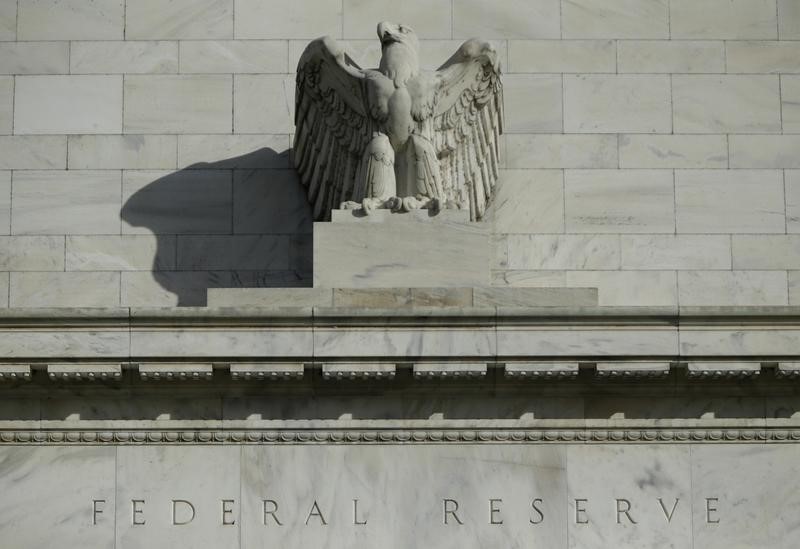By Howard Schneider and Jonathan Spicer
JACKSON HOLE, Wyo. (Reuters) - Wild swings in world financial markets this week have shown how events in China can potentially disrupt the Federal Reserve's carefully scripted policy plans. The turmoil, triggered by a rout in Chinese markets, also flagged a broader risk that the U.S. central bank may struggle to meet its inflation target until the rest of the world plays along.
As they try to nudge U.S. interest rates away from zero, policymakers might have to rethink a basic assumption that solid economic growth and swelling payrolls at home are enough to do the job even as the world's second-largest economy stutters.
"The years when China could keep on growing and pump things up – that's over. So you look around the world and ask who can take up the slack, and really the answer is nobody," said Kevin Logan, chief U.S. economist at HSBC Securities, in New York.
"I don't see how it's possible that inflation will be picking up in the United States. We're just going to have a stronger dollar, falling commodity prices, growth prospects that aren't that good, more competition from imports in the U.S. market so that labor won't have any bargaining power and wages won't be going up."
Only days ago, Fed officials had appeared ready to push interest rates higher in September based on a sense of "reasonable confidence" that inflation would rise to the central bank's 2 percent target.
Now, they are admitting things got more complicated after a rollercoaster week in financial markets caused by fears that China's gradual slowdown could turn into a crash landing.
New York Fed President William Dudley said on Wednesday that the prospect of a September rate hike "seems less compelling" than it was only weeks ago, even if he warned about overreacting to "short-term" market moves.
Global central bankers meeting this week at the annual Federal Reserve retreat in mountainous Jackson Hole, Wyoming, are likely to focus on recent market turbulence, the divergence between the world's two biggest economies and the question what is driving inflation in the post-crisis world.
The recent market swoons follow a series of other shocks - crashing oil prices, weakness in Europe, the constant deflation threat in Japan - that have held down inflation globally.
MOVING TARGET
Up to now Fed officials have argued those problems would have only a passing effect on U.S. prices, even as they kept pushing the timeline for reaching their inflation goal further into the future.
Part of the logic of the Fed's 2 percent inflation target is to allow the central bank to lift its benchmark rate and build a cushion for monetary policy to respond to any new economic threat without tightening inflation-adjusted rates too much.
Some economists, however, question long-held views such as that rising employment will eventually drive up wages and inflation, pointing out that global forces now play a prominent role in that equation.
The opening up of markets in former Soviet bloc countries, China's entry into the World Trade Organization, regional free trade pacts have all allowed capital and goods to move more freely, helping to even out and hold down costs.
In fact, as U.S. imports have increased to 15 percent of the national output by the middle of last decade from around 10 percent in early 1990s, inflation has been tracking import prices more closely, with headline inflation over that period matching the increases in prices of non-oil imports.
Some analysts have also said that globalization has been a factor in holding down U.S. wages and prices even at times of solid growth.
Over the past year, the dollar's rise has served as another anchor on consumer prices.
A rebound in U.S. stock prices on Wednesday and Thursday and a sharp upward revision in U.S. second quarter growth numbers may ease some fear that slow growth and volatility overseas will dull the U.S. recovery.
But renewed disinflationary impulses from around the globe could still make the Fed more cautious and intensify the effort to better understand how inflation works.
Some basic tenets are now in flux, also at least partly because of globalization. Some researchers, for example, argue that "core inflation" – which strips out food and energy prices and is often used by bankers as their preferred gauge – may be less relevant in a world where futures contracts, global shipping and worldwide trade help even out retail level price swings for some of those goods.
It is also far from clear how economies behave when interest rates are stuck at zero, as they have been in the United State since 2008.

"I look at data and I think that we are in an unusual situation," Michael Owyang, assistant vice president at the St. Louis Federal Reserve Bank, told Reuters. "I don't have a good model for what is happening. I have not seen these conditions before."